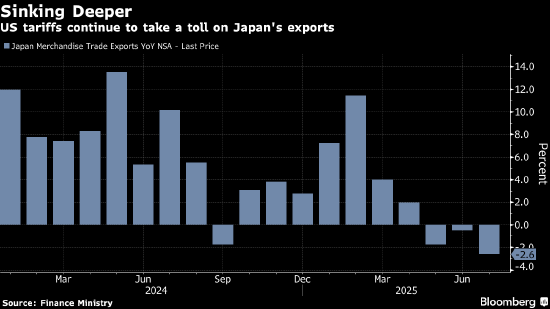Global Economic Weekly Outlook: Ahead of the Federal Reserve Meeting, U.S. Job Growth Expected to Slow Down
In August, U.S. employers showed weak hiring intentions, and the unemployment rate may rise to its highest level in nearly four years, further confirming the decline in labor market activity.
According to the median data from surveys, economists expect about 75,000 new jobs to be added in August, with the unemployment rate reaching 4.3%. If the number of jobs added for four consecutive months remains below 100,000, it will mark the weakest growth cycle since the early days of the 2020 pandemic.
Weak Growth in the U.S. Labor Market:
The employment data released by the U.S. Bureau of Labor Statistics on Friday will serve as a key reference for Federal Reserve officials ahead of the September policy meeting. Some officials are less concerned about the slowdown in job growth because the labor force participation rate is also declining; in addition, current inflation is gradually rising, so they remain cautious about cutting interest rates.
However, other officials (such as Federal Reserve Governor Waller) have stated that the slowdown in hiring in recent months means the Fed should proceed with the first rate cut of the year.
In the coming week, even though the employment report has not yet been released, investors will still pay attention to speeches by several Federal Reserve officials, including St. Louis Fed President Alberto Musalem, New York Fed President John Williams, and Chicago Fed President Austan Goolsbee. The Fed will also release the beige book on Wednesday, summarizing economic observations from across the country.
As companies focus on controlling costs (such as coping with higher import tariffs), hiring demand has gradually weakened. Another set of data scheduled for release on Wednesday is expected to show that the number of job vacancies in July declined from the previous month, possibly falling to one of the lowest levels since 2021.
To accelerate job growth, U.S. President Trump is attempting to reverse the trade imbalance, stimulate long-term investment, and promote domestic production of key goods and raw materials through tariff policies.
In the upcoming holiday-shortened week (note: a week with fewer working days due to holidays), other data to watch include the Institute for Supply Management (ISM) manufacturing and services Purchasing Managers' Index (PMI) for August. Government data released on Thursday may show that the trade deficit in goods and services widened significantly in July—preliminary data previously indicated a surge in imports before tariffs were raised.
Canada will also release employment data, and it is expected that the Canadian labor market will remain weak in August amid trade tensions. Data released on Friday showed that trade setbacks have led to Canada's first economic contraction in nearly two years.
Decline in Exports Leads to Contraction in Canadian GDP
Canada's goods trade data for July may show that although exports are slowly recovering from a three-year low in April, the trade deficit will remain high and persistent.
In addition, inflation data from the Eurozone to Turkey, key testimonies from UK policymakers, and economic activity data from across Asia will be highlights of the global economy this week.
Asia
This week will be data-intensive for Australia and South Korea, with multiple releases including second-quarter GDP. Economists expect data to be released on Wednesday to show that Australia's economic growth accelerated in the second quarter, while South Korea's economy remained flat.
Australia will also release second-quarter inventory and building permit data on Monday, and export and household spending data on Thursday. South Korea will release export data on Tuesday (with August export activity expected to slow) and the consumer price index (expected to decline month-on-month).
Thailand and Vietnam will also release Purchasing Managers' Index (PMI) data.
Japan will release second-quarter capital expenditure and corporate profit data on Monday, and will also publish July cash earnings and household spending data later in the week.

Indonesia and Thailand will release consumer price data, and the Philippines will also announce inflation data. As inflationary pressures are gradually easing, these data are expected to show that prices remained stable or declined month-on-month during the month.
In addition, Singapore will release retail sales data on Friday. Malaysia's central bank is expected to keep its interest rate unchanged at 2.75% on Thursday.
Europe, Middle East, and Africa
The Eurozone will release multiple data this week: unemployment rate on Monday, inflation data on Tuesday, and revised GDP on Friday. These data will be released under new rules—media will no longer have early access to information before the official release.
Last Friday, the economic data of the four major Eurozone economies (note: usually referring to Germany, France, Italy, and Spain) were mixed. Economists expect the inflation data to be released this week to be slightly above the European Central Bank (ECB)'s 2% target. This may give officials, who are already prepared to keep rates unchanged at the September 11 meeting, more confidence.
European Inflation Has Not Raised ECB Concerns
On Monday, ECB Executive Board members Isabel Schnabel and Piero Cipollone will chair a panel discussion at the 2025 ECB Legal Conference in Frankfurt, and ECB President Lagarde will deliver a dinner speech.
On Wednesday, Lagarde will also speak as Chair of the European Systemic Risk Board (ESRB); on Thursday, Cipollone will testify before lawmakers in Brussels. Policymakers will enter a "quiet period" on Thursday ahead of the policy meeting (note: a period before policy meetings during which officials refrain from public comments on the economy and monetary policy).
Among the data from Eurozone countries, Germany's factory orders may attract attention—as this data can serve as an early signal of the impact of U.S. tariffs on manufacturing.
Inflation will be the focus across the region:
- Wednesday: Turkey's annualized inflation rate for August is expected to decline, but will still remain above 30%. If there are signs that inflationary pressures are easing, the Turkish central bank may be able to cut rates further.
- Thursday: Switzerland's August inflation rate is expected to remain above zero for the third consecutive month—this is the last inflation report before the Swiss National Bank (SNB)'s quarterly rate decision in September.
- Same day: Sweden will release inflation data. Analysts expect the CPIF inflation index (consumer price index including fixed interest rate housing costs), which is monitored by the Riksbank, to rise to its highest level since early 2024.
The Bank of England Has Lowered Rates to a Two-Year Low
In the UK, testimony from Bank of England officials in Parliament on Wednesday will be a highlight of the week. This month's rate decision vote saw an unprecedented split, and policymakers with differing views (including Governor Andrew Bailey) all plan to speak. Retail sales data will be released on Friday.
Latin America
Mexican President Sheinbaum will announce the opening of the annual parliamentary session on Monday. The economic priorities mentioned in her speech will be closely watched.
Brazil will release second-quarter GDP data on Tuesday, with economic growth expected to slow. Although Brazil's economy may achieve 16 consecutive quarters of expansion, its quarter-on-quarter growth rate is expected to be 0.4%, and year-on-year growth 1.9%, both lower than previous data.
Other data: Chile will release July economic activity data on Monday, expected to grow 2.2% year-on-year; Peru will release August inflation data on the same day. Colombia will release inflation data on Friday, with surveys showing analysts expect its annualized inflation rate to rise above 5%.

Disclaimer: The content of this article solely reflects the author's opinion and does not represent the platform in any capacity. This article is not intended to serve as a reference for making investment decisions.
You may also like
Ethereum News Today: Institutions Stack Ethereum as Mainstream Capital Shifts
- BlackRock’s ETHA ETF captured $1.244B in inflows, ranking second among 4,400+ ETFs in late August. - Ethereum ETFs saw $10B+ cumulative inflows since July, contrasting Bitcoin ETFs’ $800M outflows. - Institutional Ethereum holdings surged to $19.1B by Aug. 29, reflecting growing corporate adoption. - Ethereum’s $135B monthly trading volume surpassed 2021 records, driven by retail and institutional demand. - Rising ETF flows and liquidity position Ethereum as a mainstream asset competing with traditional

XRP’s Emerging Role as a Global Payments Infrastructure Pillar
- XRP is reshaping cross-border payments via Ripple's ODL, processing $1.3T in Q2 2025 with 3-5 second settlements and $0.0002 fees, slashing SWIFT's 36-96 hour timelines and $26-$50 costs. - Institutional adoption grows as 300+ banks (e.g., Santander, Standard Chartered) leverage XRP for 40-90% cost reductions in corridors like Europe-Latin America and Japan-SE Asia. - Ripple's RLUSD stablecoin, backed by BNY Mellon and SBI, enables real-time settlements with 40-60% lower costs, while regulatory clarity i

Bitcoin's Institutional Turn in Asia: How Hong Kong's China Financial Leasing Signals a New Era
- Hong Kong's China Financial Leasing Group invests in Bitcoin/Ethereum ETFs as institutional hedge against USD devaluation. - Dollar weakness (11% YTD 2025) drives $29.4B inflows into U.S. spot Bitcoin ETFs, with BlackRock's IBIT managing $18B. - Hong Kong's 18 crypto ETFs ($444.6M in Bitcoin) emerge as Asia's crypto hub amid $1.41T APAC ETF growth (22.7% YTD). - Bitcoin's -0.29 inverse correlation with DXY index and fixed supply position it as "digital gold" for institutional portfolios. - Regulatory cla

Metaplanet’s Bitcoin strategy faces fundraising crunch as stock sinks: Report

